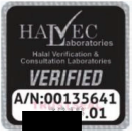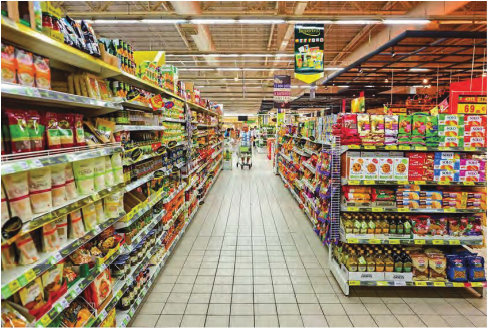01 Sep
2022
Halal Verified Sticker As Part Of Halal Assurance Practice
Approval and monitoring of halal status products are significant as the halal status of products depends on the state of ingredients used, and its process flow practise. |
By Nor Amin Mohd Noor – Chairman, Global Haltech
Halal is very crucial and also a sensitive issue for Muslims. Therefore, the halal industry is fast-growing due to its high commercial and economic value. That is the reason why the halal concept should be considered seriously by the authorities.
Approval and monitoring ofhalal status products are significant as the halal status of products depends on the state of ingredients used,and its process flow practise.
Control, enforcement and monitoring of products are highly-needed to maintain the quality and integrity of halal-certified products to ensure no persecution and misappropriation occur to Muslim consumers, especially in Malaysia.
Authorities such as JAKIM and all Jabatan Agama Islam Negeri have to play their role as most of the products are prepared by the complex formulation of recipes and using imported ingredients. With so many cases of cross-contamination of porcine happening lately, especially in halal-certified products, the halal status would be more convincing if scientifically-proven.
Halal Sticker
Halal sticker is a sticker placed on packaging to show a product has been scientifically verified through lab analysis that all ingredients involved are porcine-free and do not exceed the limit for alcohol.
The objective of the halal sticker programme is to enhance the integrity of halal-certified products. The sticker is allowed once a certified and recognised laboratory tests the product. This programme is for both categories of halal, which are :
i) Halal-certified status products
The products are already halal-certified by a local or international halal authority. As most of the halal bodies grant two years validity, reaudit only proceeds in the next two years. Within two years, anything can happen to the halal-certified product, such as crosscontamination and mishandling of product from factory to market shelf.
By having a halal sticker, it shows a halal lab monitors the product. It will create higher confidence in the consumer that halal status is retained. In this case, the halal sticker as a halal-monitoring process is an assurance practice.
ii) Non-halal-certified status products
The product is not necessarily non-halal but has yet to be certified by the halal authority. However, this category is practised for a different purpose in non-Muslim countries compared to a Muslim country like Malaysia. Anyway, using of halal stickers would be the best practise in non-Muslim countries where the Muslim population is a minority.
Non-Muslim Country
In non-Muslim countries, most of the halal authority are by Muslim NGOs and Mosque committee. Their roles are to monitor the halalness of products for the sake of Muslim minorities.
As they are not officially recognised to become a halal authority, they are faced with specific restrictions to be recognised as a halal-certification body by JAKIM or any government agency. It would be a bit of a problem to push manufacturers for products which are daily needs of Muslims.
Thus, the halal sticker is proposed so that it is more comfortable for Muslims to identify halal products.
Muslim Country The halal sticker practised in Muslim countries is a bit different as the halal authority has stringent requirements on the halal certification process. Halal-certified products are closely-monitored by halal bodies in Muslim countries to ensure the halal status is at its integrity.
But, there are problems during the halal-certification process, especially for the small and medium entrepreneur category.The said problems may lead them to fail in their business. The halal sticker may help them for the following reasons:
- Easy access to marketing
Any business investment needs to gain returns soonest possible for sustainability. When the product is ready to be marketed, halal-certification is highly value-added in a Muslim country. However, due to lack of experience in halal compliance and budget constraints, the halal-certification process may take time.
A few requirements needed by the authorities may prolong the process, but entrepreneurs need to generate revenue from the product sale for daily operation. It delays the product to the market. It is how the halal sticker can solve the problem.
The sticker is granted once the lab result proves it does not contain porcine and does not exceed the limit for alcohol. The halal-testing process takes a few days to be completed and has minimal costs. While waiting for the halal certificate, which may take months, the product can still be marketed to generate income.
- Market test
Some entrepreneurs jump into business with a unique product. There will be concern about market-acceptability. They would be reluctant to invest further for halal-certification. The halal label is compulsory for the product to succeed in a Muslim market. So, spending a little extra to ensure products are porcine-free and within limits of alcohol, would be a wise decision.
An agreement which contains very stringent requirement is needed to ensure the entrepreneur always follows the guidelines given by the halal authority. The most important thing is the halal sticker is not a lifetime. The timeframe is for one year, during which the halal-certification should be completedfailing which, the product won’t be allowed to remain in the market with the halal sticker.
The halal sticker is offered on very stringent terms, among being:
i) Laboratory’s recognition status
- eIS017025
The so-called halal-compliance labs invited for halal sticker programmes shall be accredited IS017025.However,ISO17025 is nottheonlyneed.There are also the Dst parameter and Sample scope. Halal test here is the screening for porcine and alcohol content in the product. The acceptable parameter is the pork DNA test.

Labs may provide other parameters for porcine screening such as ELISA,immunoassay,polypeptide and others,provided all those proposed test parameters have been accredited IS017025. The test parameter for alcohol-screening is the quantitative analysis of ethanol content in the sample product.
As for sample scope, the recognised halal-compliance lab will be allowed to offer testing services based on the products listed under ISO17025 accreditation. All IS017025 accredited labs will have their list of sample scope done during method validation process towards ISO17025. It means the lab is only allowed to receive sample products for halal tests based on sample scope accredited under ISO17025.
- e Authority’s Halal Panel Lab
Another stringent prerequisite is the lab should be recognised by local halal authorities such as Jakim and State halal authorities. It may also require recognition by International Halal Certification Body which is accepted by Jakim for international coverage services. Local or international halal authority’s recognition follows right after the lab has been ISO17025 accredited and fulfils all test parameter and sample scope as required under ISO17025 accrediation as mentioned above.
ii) Type of product allowed for Halal Sticker
The halal sticker is needed to prevent misuse by halal-recognised labs and manipulation by manufacturers. All parties need to have clear guidelines on the type of products allowed for the halal sticker programme.A negative result of porcine DNA screening would confirm no porcine-based ingredient in the product, but it may contain other halal animal DNA from beef, mutton, chicken and others.

Halal-slaughtering might become an issue as halal animals will remain halal if the slaughtering process was Syariahcompliant. Hence, to ensure the integrity of halal stickers, the programme is offered to products under the category of ‘nonanimal-based ingredient’. It means only plant-based and chemktllly-synthesised-based products are acceptable.
iii) Action taken on any issues arising
If any issues arise, such as products which hold the halal sticker are found to contain porcine, the responsible halal-recognised lab needs to arrange for cross-checking test under Contamination Scenario Investigation (CSI). The same product with the same batch number would be required from the factory and market shelf.
Then the product would be sent to the recognised lab and government lab for a halal test. Any findings would be discussed among the special task team to detect if it was sabotage, crosscontamination or mishandling of the formulation process. The lab would bear all the related costs.
Halal sticker is an innovative idea proposed as an alternative to enhance the halal-certification integrity itself. It would be a mutual collaboration between halal authority, halal-recognised lab and halal players. The objective is to provide the best product by the best quality with the best integrity.
Again, halal science is the best platform to harmonise all parties for the benefit of the consumers. That’s the importance of halal science, that’s the value of the halal logo,and that’s the beauty of Islam. Halal is created by Muslims but for the benefit of Muslims and non-Muslims.ⓠ
</p align>






